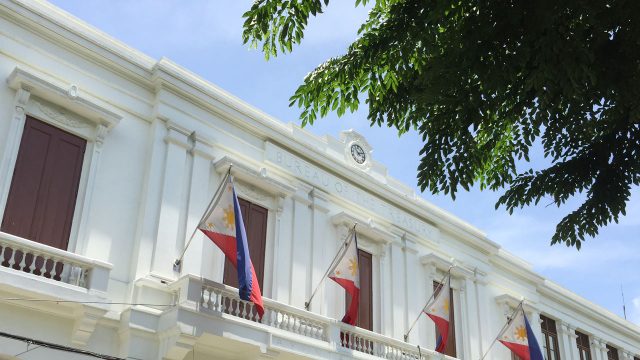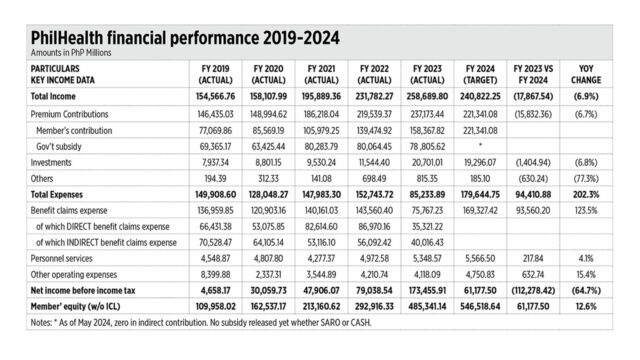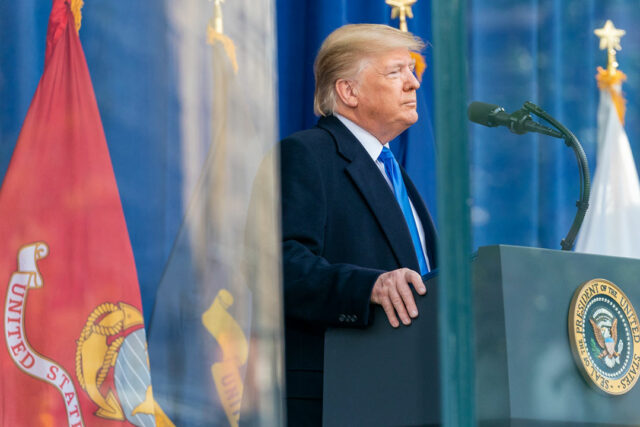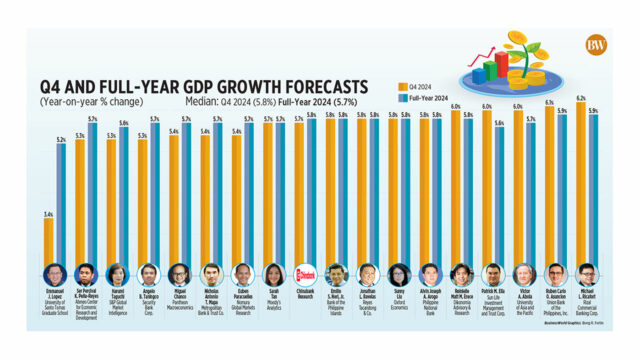On Jan. 20, 2025, Donald J. Trump was sworn in as the 47th President of the United States of America.
“I do solemnly swear that I will faithfully execute the Office of President of the United States, and will to the best of my ability, preserve, protect and defend the Constitution of the United States. So help me God.”
“The golden age of America begins right now,” Trump said as he started his inaugural speech. “From this day forward, our country will flourish and be respected again all over the world. We will be the envy of every nation, and we will not allow ourselves to be taken advantage of any longer. During every single day of the Trump administration, I will, very simply, put America first.
“But first, we must be honest about the challenges we face. While they are plentiful, they will be annihilated by this great momentum that the world is now witnessing in the United States of America. As we gather today, our government confronts a crisis of trust. For many years, a radical and corrupt establishment has extracted power and wealth from our citizens while the pillars of our society lay broken and seemingly in complete disrepair,” Trump lamented.
“We now have a government that cannot manage even a simple crisis at home while, at the same time, stumbling into a continuing catalogue of catastrophic events abroad.”
At the inaugural speech, outgoing president Joe Biden, sitting nearest to the podium from where Donald Trump spoke, was quiet and expressionless.
On his first day in office as 47th president, Trump rescinded many of Biden’s executive actions, issuing executive orders covering issues ranging from immigration and deportations to the environment and transgender rights. He is expected to sign more than 200 executive actions within his first week as president. An executive order is issued directly by the president to the federal government which does not require congressional approval. Authority for this is rooted in Article II of the US constitution, which states: “The executive power shall be vested in a president of the United States of America.” (bbc.com, Jan. 20).
Trump withdrew the US from the World Health Organization (WHO), directing the White House Office of Management and Budget to stop future transfers of US money to the WHO. The US contributes around $500 million a year to the organization, compared to China’s $40 million, despite the latter’s far larger population. Trump called the WHO “nothing more than a corrupt globalist scam” which disgracefully covered the tracks of the Chinese Communist party on the origins of the COVID-19 in the mainland. Trump, just before the end of his first term, already wanted out of WHO, but when Biden took over, he rescinded Trump’s directive to withdraw (CNN, Jan. 21). The WHO, established in 1948, is a vital and necessary anchor for cooperative efforts in global health monitoring and control.
Trump is also withdrawing the US from the Paris Climate Change agreement again — he withdrew the US during his first term of office. The US officially re-joined under President Biden in 2021. Under the international climate accord, first negotiated in 2015, countries around the world agreed to cut greenhouse gas emissions in an effort to limit global warming and forestall the worst impact of climate change (npr news, Jan. 21).
“We will be a rich nation again, and it is that liquid gold under our feet that will help to do it,” Trump said in his inaugural speech. He wants to go back to fossil fuel, which America has a lot of. “Drill, Baby, drill!” he shouted. He wants to increase fossil fuel extraction in Alaska with a command to “rescind, revoke, revise, amend, defer or grant exemptions from any and all” regulatory actions relevant in the state. Specifically, Trump is restoring any suspended fossil fuel leases within the Arctic National Wildlife Refuge. He will also “eliminate Biden policies intended to encourage electrical vehicle development and purchases — part of Trump’s effort to limit non-fossil fuel energy sectors” (Associated Press, Jan. 23).
“The most beautiful word in the dictionary,” Trump said during the election campaign, “is ‘tariff.’” Many economists disagree with that protectionist take. But Trump wants to use tariffs — that is, taxes imposed on products imported from other countries — to raise revenue, revive local manufacturing, and give American companies an advantage.
“We’ll impose new tariffs so that the products on our stores will once again be stamped with those beautiful words ‘made in the USA,’” Trump said. He has proposed a 60% tariff on Chinese-made products, and a 10% tariff on products from just about everywhere else. He has also threatened to hit Canada and Mexico with 25% tariffs — a move which would likely be economically devastating for these neighboring countries. As an aside, Trump has been joking that Canada should become “the 51st state” of the US, calling Prime Minister Justin Trudeau the “governor” (Ibid.). Note: Trudeau resigned as prime minister and Liberal party leader on Jan. 6 due to his declining popularity in Canada.
“Mexico has to stop allowing millions of people to pour into our country,” Trump said. He will be cracking down strongly and violently on illegal immigration, one of the largest deportation programs in US history, to be led by the US military. In an interview with Time magazine, he said he’ll do “whatever it takes to get them out.” The birthright privilege (jus soli), which gives automatic citizenship to babies born on US soil including those of illegal immigrants, has been revoked, even if jus soli is in the US Constitution (Ibid.). On Trump’s second day in office, the US military deported (by helicopters) 538 illegal migrants (Hindustan Times, Jan. 23).
Trump is at the same time, expansionist — wanting to acquire Greenland, a Danish territory that hosts a US military base, “for national security purposes.” He also wants to get back the Panama Canal, a shortcut between the Atlantic and Pacific Oceans which was built by the US in 1914 and transferred by President Jimmy Carter to Panama in 1977. He claims China is controlling the canal’s operations (which its administrator has denied) and has said the US is being ripped off by the fees charged to use the canal (Ibid.).
In his inaugural speech, Trump said he will change the name of the Gulf of Mexico to the “Gulf of America.” It’s his latest suggestion to redraw the Western hemisphere, a critical article said of his expansionist foreign policy (Associated Press, Jan. 21). This body of water has been depicted with that name in maps for more than four centuries, and so confirmed by the International Hydrographic Organization, of which both the US and Mexico are members. The US already constructed about 450 miles of a wall aimed at keeping illegal Mexican immigrants away from the US, in Trump’s first term. Trump will continue to “build that wall,” after the moratorium in Biden’s term. The “Gulf of America” will reinforce “The Wall.”
If Trump is so obsessed with walls and territory, why can’t he be as concerned for the territorial wars in Ukraine with the aggression of Russia, or the expansion by violence of Israel into Gaza?
“Like in 2017, we will again build the strongest military the world has ever seen. We will measure our success not only by the battles we win but also by the wars that we end — and perhaps most importantly, the wars we never get into. My proudest legacy will be that of a peacemaker and unifier. That’s what I want to be: a peacemaker and a unifier,” he said.
“I’m pleased to say that as of yesterday, one day before I assumed office, the hostages in the Middle East are coming back home to their families,” Trump said in his inaugural speech.
Biden, if he was listening to this, must have thought of the 15 months he worked on the ceasefire he proposed between Israel and Hamas in Gaza. “It appears as if both the 46th and 47th presidents are staking their foreign policy legacies on the drawn-out agreement,” a news analysis said (abc.net.au, Jan. 18).
Trump has noticeably changed tact in his treatment and strategy on both Ukrainian President Volodymyr Zelensky and Russian President Vladimir Putin. The US and European allies have rallied around Ukraine in the face of Russian aggression (which started in February 2022), supplying the country with a huge amount of military aid. “He is no angel. He shouldn’t have allowed this war to happen. We could have made a deal… and Zelensky decided that I want to fight,” Trump says of Zelensky now. “If they don’t settle this war soon, like almost immediately, I’m going to put massive tariffs on Russia, massive taxes and also big sanctions” (USA Today, Jan. 24).
What Trump says, goes. In his inaugural speech, he said, “As of today, it will henceforth be the official policy of the United States government that there are only two genders: male and female.” He rolled back federal recognition of any genders outside male and female, disallowing the use of identity pronouns in documents. He froze new regulations, froze hiring for federal workers, founded his watchdog Department of Government Efficiency (DOGE); issued an executive order related to government censorship of free speech (largely symbolic due to First Amendment protections); reversed the withdrawal of Cuba’s designation as a state sponsor of terror; reversed sanctions on Israeli settlers; rolled back policy on artificial intelligence; reversed the Family Reunification Task Force; issued a mass pardon of all Jan. 6 rioters (the ones who protested Biden’s win over Trump in the 2020 elections); designated Mexican drug cartels as foreign terrorist organizations; ordered an increase of drug stock for lethal injections on death sentences; and granted TikTok a 75-day pause before it would be banned (maybe because he used TikTok in his campaign).
“So help us, God!” The whole world watching, cries.
Amelia H. C. Ylagan is a Doctor of Business Administration from the University of the Philippines.
ahcylagan@yahoo.com

































